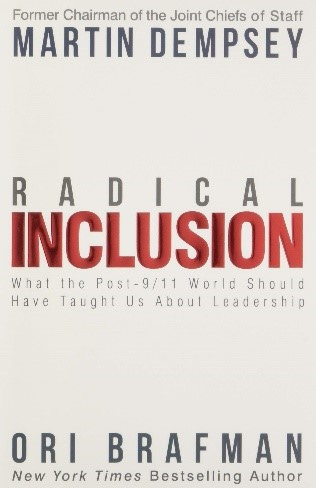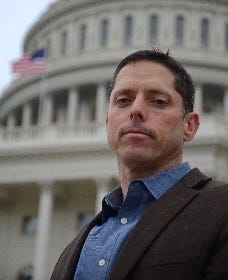A Review Essay: Radical Inclusion: What the Post-9/11 World Should Have Taught Us About Leadership
By Lieutenant Colonel Michael L. Burgoyne, U.S. Army

Authors: General Martin Dempsey, U.S. Army (Retired), and Mr. Ori Brafman
Publication Information:
Missionday, March 2018
ISBN-10: 1939714109
ISBN-13: 978-1939714107

In a divisive world of rising nationalism and populism, former Chairman of the Joint Chiefs of Staff General (retired) Marin Dempsey and researcher Ori Brafman provide a compelling argument for interconnection in Radical Inclusion: What the Post-9/11 World Should Have Taught Us About Leadership. Dempsey and Brafman propose that in “a world in which technology levels all” it becomes imperative to “develop an instinct for seeking opportunities to share control in order to preserve and even enhance the power we possess.”[1] Within the Department of Defense, Foreign Area Officers (FAO) may be best positioned to operationalize a radical inclusion foreign policy. In a world of declining relative U.S. power and ever-increasing connectivity, FAOs must “listen, amplify, and include” to enhance U.S. international partnerships and find solutions to complex security problems.[2]
Radical Inclusion is a powerful manifesto against exclusion in favor of considerate leadership and open organizations. The book builds upon a phenomenon security scholar Moises Naim dubbed the “end of power” where “micropowers” can frustrate larger powers and greatly affect the global system.[3] Revolutionary advances in communications technology cause these new power dynamics and link individuals and populations like never before. In many ways, Radical Inclusion is an expansion of Dempsey’s belief in mission command, with its principles of “commander’s intent, mission type orders, and decentralized execution”[4] Working from this basis, Dempsey and Brafman provide the foundations of a leadership philosophy based on inclusive organizations and narratives.
FAOs “facilitate close and continuous military-diplomatic interaction with foreign governments and, in particular, with their defense and military establishments”[5] FAOs work in foreign countries and international organizations. To facilitate this they acquire specialized language skills, cultural knowledge, and regional expertise. They build and maintain the bilateral and multilateral relationships that could form the basis of the military component of a radical inclusion foreign policy.
Language skills make FAOs uniquely qualified to “listen” to foreign partners. However, the godfather of Army FAOs, the late General Vernon Walters, notes: “[language] must go hand in hand with knowledge and understanding of other people’s history, literature, culture, and even poetry; in a word, all things that make them what they are.”[6] The combination of language and cultural knowledge enables FAOs to identify the “’weak signals’ that portend success or failure” and identify areas of risk or opportunity.[7]
Radical Inclusion calls on leaders to “amplify the best ideas, the best recommendations, the best practices.”[8] “The fog of war” is a Clausewitzian concept that describes uncertainty and incomplete information in war.[9] Dempsey and Brafman ask “what if the fog not only denied you access to the facts but actually convinced you of the validity of erroneous data?”[10] Incorrect or intentionally deceptive data creates a “digital echo” that in “reverberating across distributed networks -- endures forever.”[11] In this environment, FAOs must fulfill their roles as representatives of the United States by providing a positive narrative to partner militaries. U.S. partners must understand that their relationship with the U.S. military is not a cold transactional act of realist balance of power, rather it is membership in a community of nations that together guarantee the ideals represented in the United Nations Charter and in the U.S. Declaration of Independence.
Finally, the leadership instinct, “include,” operates on the counterintuitive notion that “By relinquishing control, we preserve and enhance our power.”[12] Similarly, international relations theorist John Ikenberry argues that the relative decline of U.S. power “will require new, expanded, and shared international governance arrangements” in place of the “old American-led order.”[13] FAOs play a crucial role in enacting an inclusive foreign policy to “build consensus with our teams and with like-minded partners toward longer-term solutions at sustainable levels of effort.”[14] The key to achieving this goal is creating a security conversation that drives security cooperation. The security conversation should include a discussion of national interests and shared security objectives. The United States needs the military power of its partners to maintain the liberal world order. As such, it now needs to include them in decision making and to create legitimate partnerships.
FAOs should incorporate the radical inclusion construct as outlined by Dempsey and Brafman. FAOs represent DoD’s best tool for listening and understanding partner nations, they provide a powerful and continuous opportunity to amplify positive messages and frame the strategic narrative, and they create and manage the mechanisms that cultivate inclusive bilateral and multilateral defense relationships.
About the Reviewer

Lieutenant Colonel Michael L. Burgoyne, a U.S. Army Foreign Area Officer, has served in various policy and security cooperation positions in the Americas. He served as a policy analyst in the Office of National Drug Control Policy in the Executive Office of the President. LTC Burgoyne deployed twice in support of Operation Iraqi Freedom in command and staff positions. He is the co-author of The Defense of Jisr al-Doreaa, a tactical primer on counterinsurgency. He holds a B.A. from the University of Arizona and an M.A. in Security Studies from Georgetown University.

END NOTES
[1][1] Martin Dempsey and Ori Brafman, Radical Inclusion, (Berkeley, Missionday, 2017), xv. [2][2] Ibid., xiv. [3][3] Moises Naim, The End of Power, (New York: Basic Books, 2013), 13. [4][4] Martin Dempsey, Mission Command White Paper, (Washington D.C.: Department of Defense, 2012), 2, 5.[5][5] Department of Defense, Department of Defense Directive 1315.17 Military Department Foreign Area Officer Programs, (April 28, 2005). [6][6] Vernon Walters, Silent Missions, (New York: Doubleday, 1978), 618. [7][7] Dempsey and Brafman, Radical Inclusion, 150. [8][8] Ibid. [9][9] Carl von Clausewitz, On War, ed. And trans. Michael Howard and Peter Paret, (Princeton: Princeton University Press, 1976), 102. [10][10] Dempsey and Brafman, Radical Inclusion, 7 [11][11] Ibid., 13. [12][12] Ibid., 142. [13][13] John Ikenberry, Liberal Leviathan, (Princeton: Princeton University Press, 2011), 31. [14][14] Dempsey and Brafman, Radical Inclusion, 131.


